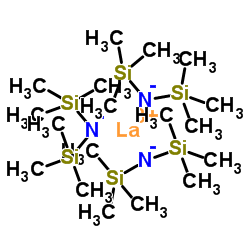175923-07-6
| 中文名 | 三[N,N-双(三甲基硅烷)胺]镧(III) |
|---|---|
| 英文名 | bis(trimethylsilyl)azanide,lanthanum(3+) |
| 中文别名 | 三[N,N-双(三甲基硅烷)胺]镧 |
| 英文别名 |
Lanthanum tris(1,1,1,3,3,3-hexamethyldisilazan-2-ide)
MFCD00271009 Silanamine, 1,1,1-trimethyl-N-(trimethylsilyl)-, lanthanum salt (3:1) Tris[N,N-bis(trimethylsilyl)amide]lanthanum(III) Lanthanum bis(trimethylsilyl)amide Lanthanum tris(bis(trimethylsilyl)amide) |
| 沸点 | 126ºC at 760mmHg |
|---|---|
| 熔点 | 149-153ºC(lit.) |
| 分子式 | C18H54LaN3Si6 |
| 分子量 | 620.060 |
| 闪点 | 36 |
| 精确质量 | 619.199707 |
| LogP | 9.08970 |
| 蒸汽压 | 11.9mmHg at 25°C |
| 储存条件 | 保存方法:密闭,阴凉,通风干燥处 |
| 稳定性 | 避氧化物、空气、水分 |
| 更多 | 1. 性状:白色粉末 2. 密度(g/mL, 25 ℃ ):未确定 3. 相对蒸汽密度(g/mL,空气=1):未确定 4. 熔点(ºC):149-153 5. 沸点(ºC,常压):未确定 6. 沸点(ºC0.1 mmHg):未确定 7. 折射率:未确定 8. 闪点(ºF):35-96 9. 比旋光度(º):未确定 10. 自燃点或引燃温度(ºC):未确定 11. 蒸气压(kPa,25ºC):未确定 12. 饱和蒸气压(kPa,60ºC):未确定 13. 燃烧热(KJ/mol):未确定 14. 临界温度(ºC):未确定 15. 临界压力(KPa):未确定 16. 油水(辛醇/水)分配系数的对数值:未确定 17. 爆炸上限(%,V/V):未确定 18. 爆炸下限(%,V/V):未确定 19. 溶解性:于水强烈反应 |
|
Section 1: Product Identification Chemical Name:Tris(N,N-bis(trimethylsilyl)amide)lanthanum(III), min. 98% (99.9%-La) (REO) CAS Registry Number:175923-07-6 Formula:C18H54LaN3Si6 EINECS Number:none Chemical Family:organometallic complex Synonym:Lanthanum tris[bis(trimethylsilyl)amide]
Section 2: Composition and Information on Ingredients IngredientCAS NumberPercentACGIH (TWA)OSHA (PEL) Title compound175923-07-6100%no datano data Section 3: Hazards Identification Emergency Overview:Irritating to skin, eyes and respiratory tract. Primary Routes of Exposure:Inhalation, skin, eyes Eye Contact:Causes slight to mild irritation of the eyes. Skin Contact:Causes slight to mild irritation of the skin. Inhalation:Irritating to the nose, mucous membranes and respiratory tract. Ingestion:No information available on the physiological effects of ingestion. May be harmful if swallowed. Acute Health Affects:Irritating to skin, eyes and respiratory tract. Chronic Health Affects:No information on long-term chronic effects. NTP:No IARC:No OSHA:No SECTION 4: First Aid Measures Immediately flush the eyes with copious amounts of water for at least 10-15 minutes. A victim may need Eye Exposure: assistance in keeping their eye lids open. Get immediate medical attention. Wash the affected area with water. Remove contaminated clothes if necessary. Seek medical assistance if Skin Exposure: irritation persists. Remove the victim to fresh air. Closely monitor the victim for signs of respiratory problems, such as difficulty Inhalation: in breathing, coughing, wheezing, or pain. In such cases seek immediate medical assistance. Seek medical attention immediately. Keep the victim calm. Give the victim water (only if conscious). Induce Ingestion: vomiting only if directed by medical personnel. SECTION 5: Fire Fighting Measures Flash Point:no data Autoignition Temperature:no data Explosion Limits:no data Extinguishing Medium:carbon dioxide, dry powder or foam If this product is involved in a fire, fire fighters should be equipped with a NIOSH approved positive pressure Special Fire Fighting Procedures: self-contained breathing apparatus and full protective clothing. Hazardous Combustion andIf involved in a fire this material may emit toxic organic fumes. Decomposion Products: Unusual Fire or Explosion Hazards: No unusual fire or explosion hazards. SECTION 6: Accidental Release Measures Spill and Leak Procedures:Small spills can be mixed with vermiculite or sodium carbonate and swept up. SECTION 7: Handling and Storage Handling and Storage:Store cold, in a tightly sealed container under an inert atmosphere of nitrogen or argon. SECTION 8: Exposure Controls and Personal Protection Eye Protection:Always wear approved safety glasses when handling a chemical substance in the laboratory. Skin Protection:Wear protective clothing and gloves. Ventilation:Handle the material in an efficient fume hood. If ventilation is not available a respirator should be worn. The use of respirators requires a Respirator Respirator: Protection Program to be in compliance with 29 CFR 1910.134. Ventilation:Handle the material in an efficient fume hood. Additional Protection:No additional protection required. SECTION 9: Physical and Chemical Properties Color and Form:white powder Molecular Weight:620.06 Melting Point:no data Boiling Point:no data Vapor Pressure:no data Specific Gravity:no data Odor:weak ammonia odor Solubility in Water:insoluble SECTION 10: Stability and Reactivity Stability:air sensitive, moisture sensitive (store cold) Hazardous Polymerization:no hazardous polymerization Conditions to Avoid:air and moisture Incompatibility:oxidizing agents and halogens Decomposition Products:carbon monoxide, carbon dioxide, lanthanum oxide and organic fumes. SECTION 11: Toxicological Information RTECS Data:No information available in the RTECS files. Carcinogenic Effects:no data Mutagenic Effects:no data Tetratogenic Effects:no data SECTION 12: Ecological Information Ecological Information:No information available SECTION 13: Disposal Considerations Disposal:Dispose of according to local, state and federal regulations. SECTION 14: Transportation Shipping Name (CFR):Non-hazardous Hazard Class (CFR):NA Additional Hazard Class (CFR):NA Packaging Group (CFR):NA UN ID Number (CFR):NA Shipping Name (IATA):Non-hazardous Hazard Class (IATA):NA Additional Hazard Class (IATA):NA Packaging Group (IATA):NA UN ID Number (IATA):NA SECTION 15: Regulatory Information TSCA:Not listed in the TSCA inventory SARA (Title 313):Title compound not listed Second Ingredient:none SECTION 16 - ADDITIONAL INFORMATION N/A |
|
生态学数据: 1、其它有害作用:通常对水稍微危害的,若无政府许可,勿将材料排入周围环境。
|
| 符号 |


GHS02, GHS05 |
|---|---|
| 信号词 | Danger |
| 危害声明 | H228-H261-H314 |
| 补充危害声明 | Reacts violently with water. |
| 警示性声明 | P210-P231 + P232-P280-P305 + P351 + P338-P310-P422 |
| 个人防护装备 | Eyeshields;Faceshields;full-face particle respirator type N100 (US);Gloves;respirator cartridge type N100 (US);type P1 (EN143) respirator filter;type P3 (EN 143) respirator cartridges |
| 危害码 (欧洲) | F,C |
| 风险声明 (欧洲) | R11 |
| 安全声明 (欧洲) | S16 |
| 危险品运输编码 | UN 3396 4.3/PG 2 |
| 包装等级 | II |
| 危险类别 | 4.1 |


